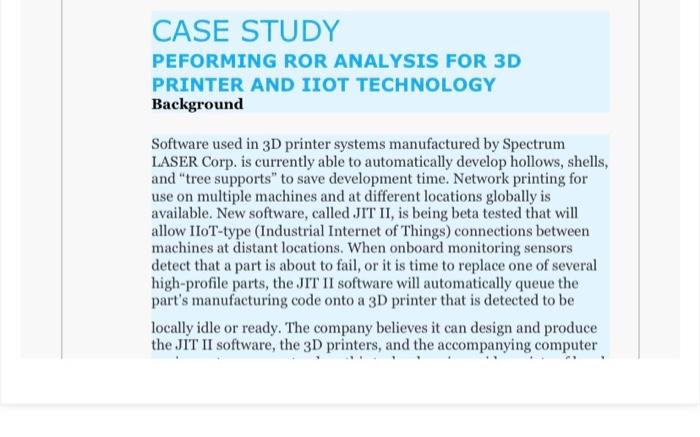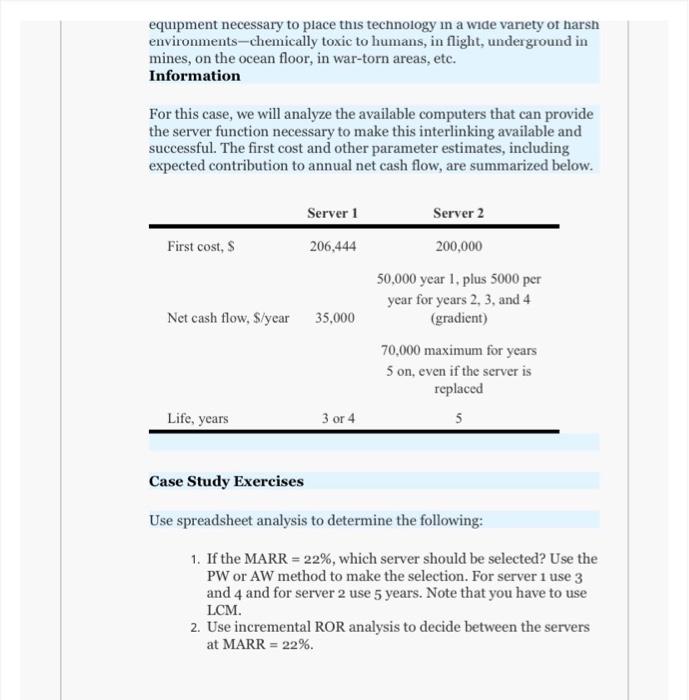CASE STUDY PEFORMING ROR ANALYSIS FOR 3D PRINTER AND IIOT TECHNOLOGY Background Software used in 3D printer systems manufactured by Spectrum LASER Corp. is currently able to automatically develop hollows, shells, and "tree supports" to save development time. Network printing for use on multiple machines and at different locations globally is available. New software, called JIT II, is being beta tested that will allow IIoT-type (Industrial Internet of Things) connections between machines at distant locations. When onboard monitoring sensors detect that a part is about to fail, or it is time to replace one of several high-profile parts, the JIT II software will automatically queue the part's manufacturing code onto a 3D printer that is detected to be locally idle or ready. The company believes it can design and produce the JIT II software, the 3D printers, and the accompanying computer equipment necessary to place this technology in a wide variety of harsh environments-chemically toxic to humans, in flight, underground in mines, on the ocean floor, in war-torn areas, etc. Information For this case, we will analyze the available computers that can provide the server function necessary to make this interlinking available and successful. The first cost and other parameter estimates, including expected contribution to annual net cash flow, are summarized below. Server 1 Server 2 First cost, $ 206,444 Net cash flow, S/year 35,000 200,000 50,000 year 1, plus 5000 per year for years 2, 3, and 4 (gradient) 70,000 maximum for years 5 on, even if the server is replaced 5 Life, years 3 or 4 Case Study Exercises Use spreadsheet analysis to determine the following: 1. If the MARR = 22%, which server should be selected? Use the PW or AW method to make the selection. For server 1 use 3 and 4 and for server 2 use 5 years. Note that you have to use LCM. 2. Use incremental ROR analysis to decide between the servers at MARR = 22%. CASE STUDY PEFORMING ROR ANALYSIS FOR 3D PRINTER AND IIOT TECHNOLOGY Background Software used in 3D printer systems manufactured by Spectrum LASER Corp. is currently able to automatically develop hollows, shells, and "tree supports" to save development time. Network printing for use on multiple machines and at different locations globally is available. New software, called JIT II, is being beta tested that will allow IIoT-type (Industrial Internet of Things) connections between machines at distant locations. When onboard monitoring sensors detect that a part is about to fail, or it is time to replace one of several high-profile parts, the JIT II software will automatically queue the part's manufacturing code onto a 3D printer that is detected to be locally idle or ready. The company believes it can design and produce the JIT II software, the 3D printers, and the accompanying computer equipment necessary to place this technology in a wide variety of harsh environments-chemically toxic to humans, in flight, underground in mines, on the ocean floor, in war-torn areas, etc. Information For this case, we will analyze the available computers that can provide the server function necessary to make this interlinking available and successful. The first cost and other parameter estimates, including expected contribution to annual net cash flow, are summarized below. Server 1 Server 2 First cost, $ 206,444 Net cash flow, S/year 35,000 200,000 50,000 year 1, plus 5000 per year for years 2, 3, and 4 (gradient) 70,000 maximum for years 5 on, even if the server is replaced 5 Life, years 3 or 4 Case Study Exercises Use spreadsheet analysis to determine the following: 1. If the MARR = 22%, which server should be selected? Use the PW or AW method to make the selection. For server 1 use 3 and 4 and for server 2 use 5 years. Note that you have to use LCM. 2. Use incremental ROR analysis to decide between the servers at MARR = 22%








